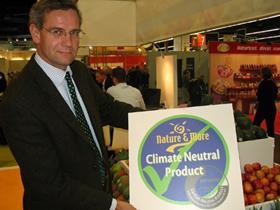
The idea that food prices should reflect the true cost of food, including the less obvious but no less important impact on the environment and society, is not a new one, but it is far from the current reality. In fact, food has never been cheaper than it is today.
According to the UN's Food and Agriculture Organisation (FAO), the hidden costs of conventionally produced food amount to US$700bn in environmental damage and US$900bn in social costs, or US$1.6tr combined.
“If prices of food products were to reflect the true costs, organic products would be significantly cheaper than conventional products,” said Volkert Engelsman, CEO and founder of organics specialist Eosta and the Nature & More transparency system.
At Green Week in Berlin, Nature & More teamed with international organic umbrella organisation IFOAM to launch the True Cost of Food initiative to show consumers the true difference between organic and conventional products.
Berlin-based retailer BioCompany was selected as the launching partner, and Nature & More is intent on making information about the true cost of products such as grapes, pears and pineapples available at point of sale.
BioCompany CEO Georg Kaiser commented: 'We are thrilled to be the first food store in the whole of Germany to communicate the real costs of food. The first results confirm the choice we have made: organic is the way to go.'
Engelsman said that the inclusion of external costs like water pollution, loss of biodiversity, climate change and the impact on health and livelihoods had thrown new light on the current situation.
“If you look at the numbers, it becomes crystal clear that conventionally produced food should be considerably more expensive than organic food,” he said. “We can now show how big the difference really is. What are the environmental and social costs that we are pushing on to our children, grandchildren, and nature? To make this transparent, we developed a communication tool, the True Cost Flower of Nature & More. This allows the consumer to see it at a glance.”
'Enough talking now,” concluded former German minister of agriculture and Green politician Renate Künast. 'Making these costs transparent at point of sale is a revolutionary step, and a food revolution is just what we need.'



